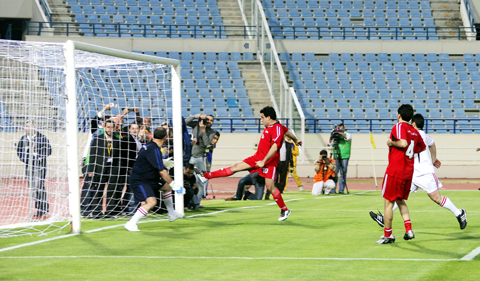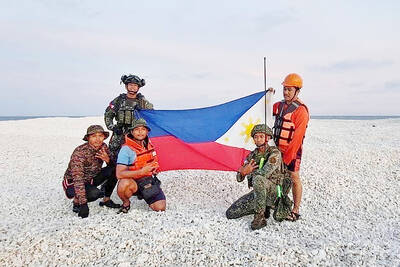Rival Lebanese politicians took their disputes to the playing fields with a friendly soccer match to mark the 35th anniversary of the outbreak of the country’s 1975-1990 civil war.
There were no spectators in the stadium on Tuesday, however — a two-year old regulation prohibits audiences at soccer stadiums following incidents of sectarian violence during games.
“We are one team” was the slogan for the thirty-minute match played by ministers and legislators and attended by the Lebanese president.

PHOTO: EPA
On April 13, 1975, an ambush by Christian gunmen of a busload of Palestinians sparked a civil war that lasted 15 years, killed 150,000 people and caused US$25 billion in damage.
Almost two decades after war ended, the country enjoys a precarious peace but this small Mediterranean nation, home to 18 religious sects, is still sharply split along sectarian and political lines with occasional outbreaks violence.
A fragile national unity government headed by prime minister Saad Hariri was formed in November last year, which includes politicians from the Syria and Iran-backed Hezbollah.
Marking the war’s anniversary Tuesday, lawmakers from the Shiite Muslim Hezbollah group and their allies played alongside politicians in the Western-backed parliamentary majority.
“The message is that sports can unite the Lebanese, and this is a very important since politics unfortunately is not uniting them,” lawmaker Sami Gemayel of the right-wing Christian Phalange Party told reporters.
In Tuesday’s game, the teams were split into red and white teams, the colors of the Lebanese flag, with the words, “We are all one team,” printed on the back of the uniforms.
The politicians high-fived, hugged and kissed following the game as they posed for pictures.
“I wish they would love each other as much in real life, instead of fighting all the time,” said Rania Achkar, a 38-year-old woman who was watching it at home on TV. “It’s a nice idea but they’re just kidding themselves and us.”
The game was broadcast live on local TV stations and was covered by local and international media, but the stadium was closed off to spectators — in line with regulations of the Lebanese Football Association to prevent violence because of violence in stadiums between Sunnis and Shiites supporting rival teams where sometimes injuries occurred.
“Today we are also sending a message of sportsmanship to sports fans in Lebanon. Everyone should accept the rules of the game,” health minister and participant Mohammed Jawad Khalifeh said.
The game was played at the Sports City in Beirut, rebuilt 18 years after it was bombed out by Israel in 1982.
“Those dark days are never coming back,” Hariri said.
The 40-year-old prime minister played throughout the game, jogging back and forth on the soccer field, but didn’t score. Gemayel, who was on Hariri’s team, scored the game’s only two goals.
“I feel great,” a sweaty Hariri said grinning after the game.
Ali Ammar, one of two Hezbollah lawmakers taking part, said he had been fine-tuning his muscles and doing sprints for the past weeks in preparation.
“I hope that this good sportsmanship will reflect itself on politics as well,” he said.
Gemayel, a vehement Hezbollah critic who often clashes verbally its members, said he had “a positive feeling” playing with Hezbollah politicians.
“Sports is one thing and politics is another. At the World Cup, countries that are at war play against each other. Why can’t we?” he said.

Kehinde Sanni spends his days smoothing out dents and repainting scratched bumpers in a modest autobody shop in Lagos. He has never left Nigeria, yet he speaks glowingly of Burkina Faso military leader Ibrahim Traore. “Nigeria needs someone like Ibrahim Traore of Burkina Faso. He is doing well for his country,” Sanni said. His admiration is shaped by a steady stream of viral videos, memes and social media posts — many misleading or outright false — portraying Traore as a fearless reformer who defied Western powers and reclaimed his country’s dignity. The Burkinabe strongman swept into power following a coup in September 2022

TRUMP EFFECT: The win capped one of the most dramatic turnarounds in Canadian political history after the Conservatives had led the Liberals by more than 20 points Canadian Prime Minister Mark Carney yesterday pledged to win US President Donald Trump’s trade war after winning Canada’s election and leading his Liberal Party to another term in power. Following a campaign dominated by Trump’s tariffs and annexation threats, Carney promised to chart “a new path forward” in a world “fundamentally changed” by a US that is newly hostile to free trade. “We are over the shock of the American betrayal, but we should never forget the lessons,” said Carney, who led the central banks of Canada and the UK before entering politics earlier this year. “We will win this trade war and

‘FRAGMENTING’: British politics have for a long time been dominated by the Labor Party and the Tories, but polls suggest that Reform now poses a significant challenge Hard-right upstarts Reform UK snatched a parliamentary seat from British Prime Minister Keir Starmer’s Labor Party yesterday in local elections that dealt a blow to the UK’s two establishment parties. Reform, led by anti-immigrant firebrand Nigel Farage, won the by-election in Runcorn and Helsby in northwest England by just six votes, as it picked up gains in other localities, including one mayoralty. The group’s strong showing continues momentum it built up at last year’s general election and appears to confirm a trend that the UK is entering an era of multi-party politics. “For the movement, for the party it’s a very, very big

The Philippines yesterday slammed an “irresponsible” Chinese state media report claiming a disputed reef in the South China Sea was under Beijing’s control, saying the “status quo” was unchanged. Tiexian Reef (鐵線礁), also known as Sandy Cay Reef, lies near Thitu Island, or Pagasa, where the Philippines stations troops and maintains a coast guard monitoring base. Chinese state broadcaster CCTV on Saturday said that the China Coast Guard had “implemented maritime control” over Tiexian Reef in the middle of this month. The Philippines and China have been engaged in months of confrontations over the South China Sea, which Beijing claims nearly in its